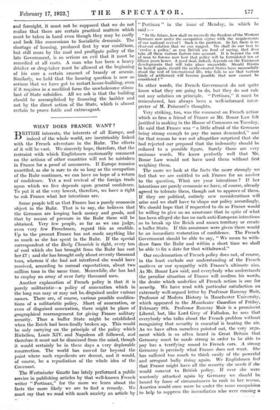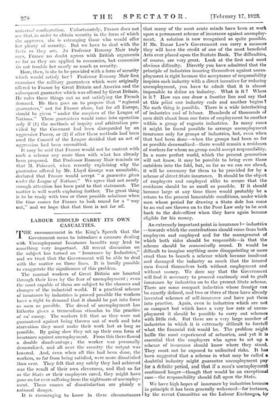WHAT DOES FRANCE WANT ? B RITISH interests, the interests of
all Europe, and indeed of the whole world, are inextricably linked with the French adventure in the Ruhr. The effects of it will be vast. We sincerely hope, therefore, that the restraint with which Englislunen customarily comment on the actions of other countries will not be mistaken in France for a proof of unconcern. If Europe remains unsettled, as she is sure to do so long as the occupation of the Ruhr continues, we can have no hope of a return of confidence. Yet a real revival of the foreign trade upon which we live depends upon general confidence. To put it at the very lowest, therefore, we have a right to ask France what her intentions are.
Some people tell us that France has a purely economic object in the Ruhr. That is to say, she believes that the Germans are keeping. back money and goods, and that by means of pressure in the Ruhr these will be obtained. Very few people, so far as we can judge, even very few Frenchmen, regard this as credible. Up to the present France has not made anything like so much as she has spent in the Ruhr. If the special correspondent of the Daily Chronicle is right, every ton of coal which she has brought from the Ruhr has cost her 17 ; and she has brought only about seventy thousand tons, whereas if she had not interfered she would have received, according to normal expectations, about two million tons in the same time. Meanwhile, she has had to employ an army of over forty thousand men.
Another explanation of French policy is that it is purely militaristic—a policy of annexation which in the long run may or may not be. disguised under various names. There are, of course, various possible modifica- tions of a militaristic policy. Short of annexation, or even of disguised annexation, there might be plans of geographical rearrangement for giving France military security. Thus a buffer State might be established when the. Reich had been finally broken up. This would be only carrying on the principle of the policy which Richelieu, Louis XIV. and Napoleon all followed, and therefore it must not be dismissed from the mind, though it would certainly be in these days a very deplorable resurrection. The world has moved far beyond the point where such expedients are decent, and it would, of course, be a repudiation of the whole idea of the Covenant.
The Westminster Gazette has lately performed a public service in publishing articles by that well-known French writer " Pertinaac," for the more we learn about the facts the more likely we are to find a remedy. We must say that we read with much anxiety an article by " Pertinax " in the issue of Monday, in which he said :— . .
" In the future, how shall we reconcile the freedom of the Western Germans now under the occupation reg,inte with the requirements of our national revival ? Such is the problem. So far, there is no clear-cut solution that we can suggest. We shall do our best to evolve a poilcy,' as you British are fond of saying, that does take all these various factors into account. It is beyond the wit of man to foresee now how that policy will be formulated ten or fifteen years hence. A good deal, indeed, depends on the European developments that will take place meanwhile. Should Russia be herself again, should the newly-created States have successfully stood the test of international hfe, who fails to see that various kinds of settlement will become possible that now cannot be considered 1 " In other words, the French Government do not quite know what they are going to do, but they do not rule out any solution on principle. " Pertinax," it must be remembered, has always been a well-informed inter- preter of M. Poincare's thoughts.
Very striking, too, was the comment on French action which so firm a friend of France as Mr. Bonar Law felt justified in making in the House of Commons on Tuesday. He said that France was " a little afraid of the Germans being strong enough to pay the sums demanded," and for that reason he was not altogether surprised that she had rejected our proposal that the indemnity should be reduced to a possible figure. Surely those are very ominous words. We know perfectly well that Mr. Bonar Law would not have used them without first weighing them.
The more we look at the facts the more strongly we feel that we are entitled to ask France for an answer to the question, What are your intentions ? If her intentions are purely economic we have, of course, already agreed to tolerate them, though not to approve of them. If they arc political, entirely new considerations will arise and we shall have to 'shape our policy accordingly. We should hope that if requested to do so France would be willing to give us an assurance that in spite of what has been alleged she has no such anti-European intentions as to break up the Reich and annex territory or create a buffer State. If this assurance were given there would be an immediate restoration of confidence. The French Government should be able to say, " We mean to with- draw from the Ruhr and within a short time we shall be able to fix a date for that withdrawal."
Our condemnation of French policy does not, of course, in the least exclude our understanding of the French motives or our sympathy with France's ultimate aim. As Mr. Bonar Law said, and everybody who understands the peculiar situation of France will confirm his words, the desire which underlies all French action is one for security. We have read with particular satisfaction an extremely well-argued letter by Professor Ramsay Muir, Professor of Modern History in Manchester University, which appeared in the Manchester Guardian of Friday, February 9th. Professor Ramsay Muir is a prominent Liberal, but, like Lord Grey of Fallodon, he sees that everybody who talks about the French problem without recognizing that security is essential is beating the air. As we have often ourselves pointed out, the very argu- ment which is so often heard in Great Britain that Germany must be made strong in order to be able to pay has a terrifying sound to French cars. A strong Germany is precisely what France does not want. She has suffered too much to think easily of the powerful and arrogant bully rising again. We Englishmen feel that France might have all the security she needs if she would consent to British policy. If ever she were wantonly attacked again by Germany we should be bound by force of circumstances to rush to her rescue. America .would once more be under the same compulsion to help to suppress the incendiaries who were causing a universal conflagration. Unfortunately, France does not see that, in order to obtain security in the form of which she approves, she is estranging those who would offer her plenty of security. But we have to deal with the facts as they arc. As Professor Ramsay Muir truly says, France no doubt agrees with British arguments so far as they are applied to economics, but economics do not trouble her nearly so much as security.
How, then, is she to be provided with a form of security which would satisfy her ? Professor Ramsay Muir first examines the military guarantees which were originally offered to France by Great Britain and America and the subsequent guarantee which was offered by Great Britain. He rules these things out as not satisfying the French demand. He then goes on to propose that " regional guarantees," not for France alone, but for all Europe, should be given " under the auspices of the League of Nations." These guarantees would come into operation only if (1) the methods of inquiry and arbitration pro- vided by the Covenant had been disregarded by an aggressive Power, or (2) if after these methods had been used the Council of the League decided that an act of aggression had been committed.
It may be said that France would not be content with such a scheme any more than with what has already been proposed. But Professor Ramsay Muir reminds us that M. Poinear6, when recently explaining why the guarantee offered by Mr. Lloyd George was unsuitable, declared that France would accept " a guarantee given finder the League of Nations." We agree that not nearly enough attention has been paid to that statement. The matter is well worth exploring further. The great thing is to be ready with two or three possible solutions when the time comes for France to look round for a " way out," and we hope that that time is not far off.











































 Previous page
Previous page